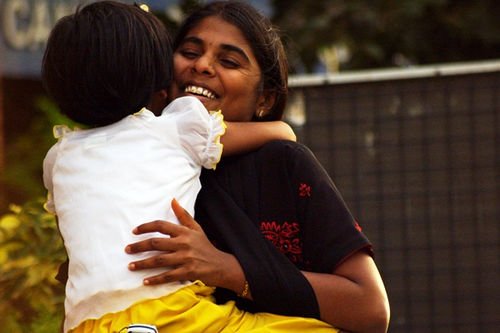If as a parent you’ve noticed your child is being rude or exhibiting any form of aggressive behaviour, then it’s important to understand that this may cause issues for them later.
More so if this is not just your child throwing a tantrum but it is a behaviour that your child frequently exhibits towards others.
It’s important to notice here that your child will probably think that this kind of behaviour is normal and acceptable. Unless they are taught that it isn’t.
If you’re worried about how this behaviour can be changed or you’re wondering where this kind of behaviour is coming from, then you’re not alone. Your child isn’t doing anything on purpose and simply needs to be directed the right way.
We have spoken to an expert in the field of child psychology, Vidya Ragu, who understands a lot about child behaviour, where it stems from and what can be done to alter it. She explains to us the reasons behind a child’s aggressiveness and how that aggressiveness can be put an end to.
What happens if you don’t curb your child’s aggressive behaviour when they’re young?
Every time you give in to your child’s aggressive and rude demands and every time you don’t correct their behaviour by reprimanding them, you’re just reiterating that it’s alright to be aggressive. In fact, by giving in to their demands while they’re being violent or aggressive, you’re teaching them that they can get what they want out of you.
So, when left uncorrected, this behaviour branches out into the different aspects of the child’s life, be it at home, school, or with their friends. The child may even begin to exhibit certain forms of bullying.
What is a major cause of aggressive behaviour among children?
As Vidya points out and explains, any output of behaviour that you see in someone, especially in a child, has input from somewhere in the environment. A major part of a child’s behaviour is learned from the environment because children are extremely impressionable.

They’re still getting accustomed to everything around them and are just learning how things work. As they explore this realm, they are going to pick up behaviour and responses from the people in their environment.
So, here, importance should be placed on keeping in check how you and other adults around the child behave around them, and to them.
Do you know any adult around you that:
- Exhibits any form of aggressive behaviour in front of your child?
- Is constantly screaming at your child to get them to do what they want them to?
- Hits your child if they make a mistake?
If yes, then it’s normal for your child to mirror that sort of aggressive behaviour. It’s important to alter the input you’re providing your child with.
If not, then it’s probably time you start to monitor the behaviour your child’s friends are exhibiting to look for traces of violence, or even begin to pay attention to the kind of television or Youtube videos your child watches.
Is an aggressive child always aggressive?
Not necessarily. It’s important to keep in mind that your child can simply be situationally aggressive, too. An example of this would be your child only showing their aggressive side to kids younger than them, or only to their friends, or only to the adults at home. But this would also be quite a relevant problem to sort out, too.
Let’s look at another major cause of aggressiveness among kids – Reinforcement.
As mentioned earlier, when a child isn’t provided with negative reinforcement or punishment when they’re aggressive, they can continue to engage in the behaviour.
Vidya stresses the importance of not encouraging such violent behaviour from your child.
Positive reinforcement of the aggressive behaviour would encourage it even more. When you call your child ‘tough’ or ‘fearless’ just because they hit some other kid, you’re teaching them that it’s good to hit other people.
This is the wrong thing to be teaching your child and by doing this, you can’t expect anything but aggressive behaviour from them. They may even think of it as a way to get your approval, in these cases.
RELATED: 5 Powerful Ways To Handle Your Child’s Temper Tantrums [Expert Tips]
7 Ways to curb aggressive behaviour in your child :
- Communicate
Explain to your child that aggressive behaviour is unacceptable and certainly isn’t okay through the methods mentioned above.
Tell them to consider the other person’s feelings and emotions and explain to your child that the person they’re being aggressive with is just like them and have the same feelings.
2. Adopt the consequential approach
If the behaviour still isn’t stopped, tell your child that ‘so and so’ happens. You attach consequences to your child’s aggressive behaviour and inform your child of them.
For example, if your child is constantly hitting their friends or even you, instead of verbally communicating their emotion, tell them the effect it will have on the affected person, and also the negative consequences it will have on them!
As you keep attaching these consequences to their aggressive behaviour, they will automatically ingrain that it’s unacceptable to be violent or aggressive.

- Suggest alternative ways in which they can deal with their aggressive urges
You can give your child different kinds of input by telling them how to deal with their aggressive emotions aside from exhibiting violence.
For example, you can suggest to them that every time they’re feeling excessively angry, they should try to do an activity like drawing out their emotion, writing down how they feel and why they feel that way, playing with their toys or distracting themselves in any other way they please for a while.
Then, once they’ve concluded emotions to why they feel how they feel, they can discuss it in a conversation with the person it concerns and decide what needs to be changed.
4. Ask them for suggestions on how they would like to handle such situations:
You can tell your child about how you would handle aggressiveness in a way that they would understand, and then ask them for suggestions on how they would like to handle it.
Ask them how they could communicate with a person they feel angry with without being aggressive, violent or hurtful, while still finding a solution to the problem.
This makes your child better prepared for handling these situations alone in the best possible way.
Vidya also explains that this will help them claim responsibility for their own behaviour.
- Encourage even a small portion of the progress
Whenever you see your child take even the tiniest step out of their way to ensure that they don’t get violent when they’re angry or upset with someone, encourage that behaviour.
For example, if you see your child simply responding with, ‘It’s okay,’ when someone apologizes about something to them, it’s important to reward that behaviour by praising them or giving them something small they like.
Vidya specifically explains that parents need to stress the difference in behaviour they see in the child and point it out to the child so that they are aware of the positive change they have undergone.
- Help your child learn self-control while setting firm limits on behaviour for them
Make sure you teach your child to think about the actions they’re going to perform before they perform them.
 This would teach your child self-control and also self-discipline. It’s also very important to specify the forms of behaviour that are okay for your child to indulge in and the forms that aren’t.
This would teach your child self-control and also self-discipline. It’s also very important to specify the forms of behaviour that are okay for your child to indulge in and the forms that aren’t.
For example, you should be firm in telling your child that they can’t shout at people, call them names or hit them no matter what the reason may be.
- Remind your child that it’s okay to feel anger
It’s important to stress the fact that it’s okay for your child to be angry, but how they deal with that anger is very important and something they would have to change if they’re aggressive.
With all these tips and methods, your aim is not to get your child to behave the way you want them to, but to get them to want to behave in a better and more considerate way.
That’s why you shouldn’t just order them around and you need them to understand the importance of kindness, self-control, and being understanding of others’ emotions, which is all it takes to control aggressive behaviour.
With time, reinforcement, practise in dealing with anger in alternative ways and a deeper understanding of how others feel, your child will certainly want to be a better person and make an active effort to control aggressive behaviour.






